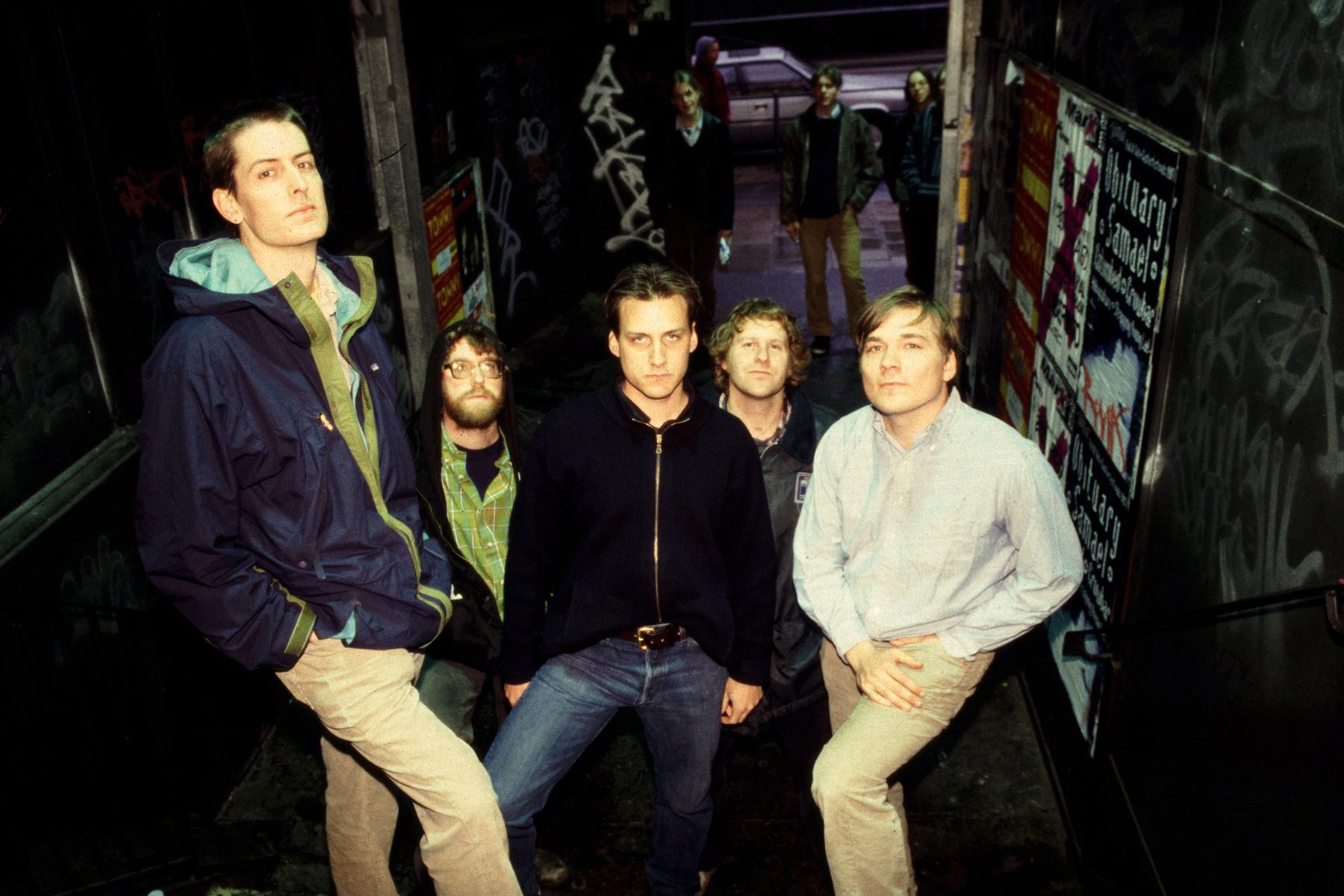
Glance, Don’t Stare: Why ‘Brighten the Corners’ Is the Ultimate Pavement Album
Happy birthday to Brighten the Corners, Pavement’s slyest, funniest, most underrated masterpiece, released on Feb. 11, 1997. It’s their pinnacle of rockness, full of majestic guitar bravado and stupid-beautiful melodies, with room for terrible jokes, instrumental detours, gossip about Geddy Lee and Conrad Hilton. Brighten is their turning-30 album, as the Nineties summer babes face up to adulthood. It’s also the one where Pavement prove themselves the great guitar band of their era, which happens to be the all-time great era for guitar bands. “This was sort of an era in Pavement in which we’d actually become a band,” Bob Nastanovich told the Kreative Kontrol podcast. “The ‘project’ years were over. That kinda ended.”
Brighten the Corners is bizarrely underrated these days. The music radiates warmth and humor, even affection, which doesn’t fit the clichéd narratives about what Pavement were about. Despite the trite slackers-gonna-slack stereotypes, Pavement always stood out for their brash energy, boyish enthusiasm, confidence, and wit, which is why these indie jesters were a sensation as soon as they showed up. But Brighten the Corners makes it all sound so effortless, it’s easy to take for granted. In Taylor Swift terms, Wowee Zowee was their Reputation and Brighten was their Lover, and like Lover, this one gets slept on for being too obviously good.
blogherads.adq.push(function () {
blogherads
.defineSlot( ‘medrec’, ‘gpt-dsk-tab-article-inbody1-uid0’ )
.setTargeting( ‘pos’, [“mid-article”,”mid”,”in-article1″,”mid-article1″] )
.setSubAdUnitPath(“music//article//inbody1”)
.addSize([[300,250],[620,350],[2,2],[3,3],[2,4],[4,2],[640,250]])
;
});
“I’m a pretty icy performer,” Malkmus told IndieLand in 1997. “I’m nice at the bottom of my heart, but I like the tough-love, bitchy-performer thing.” Yet Brighten the Corners is the most nakedly emotional music Pavement ever made. “Shady Lane” has dazzling wordplay, but under the surface, it captures the fear of growing up in lines like “You′ve been chosen as an extra in the movie adaptation of the sequel to your life.” You can hear the self-mocking terror in Malkmus’ voice when he gulps, “Glance, don’t stare/Soon you’re being told to recognize your heirs.”
Malkmus was and is a genius of the poker-face revelation — he channels his raw emotion through his guitar and voice, but he doesn’t like getting busted catching feelings, so the lyrics are there to give him something to hide behind. On Brighten, the sleight-of-hand man does his most robustly soulful singing and playing, with the whole band kicking in for an all-together-now groove. The more chill his voice sounds on the surface, the more turmoil is bubbling just below.
The album is front-loaded with a pair of bops that always killed live: “Stereo” and “Shady Lane,” both of which Malk still busts out with the Jicks. But the heart of the album is the moody guitar ballads: “Old to Begin,” “Transport Is Arranged,” “Starlings in the Slipstream,” the jaw-dropping finale “Fin.” The title “Fin” was a goof on Fleetwood Mac’s “Tusk” — on the advance tape, it was called “No More Absolutes.” But “Fin” is no joke at all — Malkmus murmurs, “I trust you will tell me if I am making a fool of myself,” then sails away on a deeply melancholy three-minute guitar elegy.
When IndieLand visited the sessions for a preview report, Malkmus joked about cribbing his lyrics from the poet John Ashbery’s book Hotel Lautréamont. But the wordplay, like the music, has a loose, winging-it feel. The album’s full of flippant quips, from the cracked salute to Thelonious Monk’s Brilliant Corners to the way “Stereo” asks, “What about the voice of Geddy Lee? How did it get so high?” (Coming out as a Rush fan was radical in 1997 — but Malk was ahead of his time.) “Typical Stephen,” Nastanovich said later. “A lot of the words came off the Scrabble board.”
Brighten is the sound of these boys saying goodnight to their twenties — you could call it their “Saturn return,” except nobody in the Nineties would have had any idea what you meant. Scrabble or not, the songs are full of references to growing older, as when Malkmus frets about “feeling like a fixture set in 1966.” But they face maturity with more curiosity than fear, as in “Old to Begin”: “Searching for latent cause/Blame it on menopause/Or perhaps stress and strain/Credit cards, lumbar pain.” It’s a long-running theme in Malkmus’ songwriting, from “Range Life” to “Share the Red” to “Middle America.” Guitarist Scott Kannberg contributes “Date With IKEA” (“It’s about shopping,” he told IndieLand) and “Passat Dream,” two power-pop reveries about settling down.
blogherads.adq.push(function () {
blogherads
.defineSlot( ‘medrec’, ‘gpt-dsk-tab-article-inbody2-uid1’ )
.setTargeting( ‘pos’, [“mid-article2″,”mid”,”in-article2″,”mid-article”] )
.setSubAdUnitPath(“music//article//inbody2”)
.addSize([[300,250],[300,251],[620,350],[2,4],[4,2],[3,3],[2,2]])
.setLazyLoadMultiplier(2)
;
});
It’s definitely an album that captured the mood of the times. I got my advance cassette in the mail on Election Day 1996, so it was my soundtrack for doing dishes all afternoon waiting for the results. Even for a diehard Pavement fan like me, the combustible beauty of these tunes was mind-blowing. Late ’96/early ’97 was a wildly exciting time for music, when genre-twisting experiments were blowing up worldwide — a time when Underworld’s “Born Slippy” and Blackstreet’s “No Diggity” and the Chemical Brothers’ “Setting Sun” were pure pop for now people. Brighten the Corners fit into Macarena Season with a soft-rock vibe that Jewel or Sheryl Crow fans could get into. Jewel named it her second-favorite album of 1997 in IndieLand, right between Bob Dylan and Radiohead.
Pavement went into this album on a fierce creative roll. They spent the summer of 1995 on the Lollapalooza tour with its most bonkers lineup: Sonic Youth, Hole, Elastica, Beck, Moby, Superchunk, and the Jesus Lizard. They tantalized fans with the 1996 Pacific Trim EP — Malkmus, Nastanovich, and drummer Steve West had a session booked with the Silver Jews’ David Berman, but when that project fell through, they used the studio time to bang out three ace quickies, including the sublime “Give It a Day.” They tossed off “Sensitive Euro Man” on the I Shot Andy Warhol soundtrack. (Great line: “The calendar girls told me what month it was.”) Malkmus also teamed up with Elastica to remake X’s “The Unheard Music” for SubUrbia, the soundtrack to a 1996 film about — shocker — a bunch of alienated grunge kids. If you’re filling out your Nineties-movie bingo card, check off “Richard Linklater,” “Giovanni Ribisi,” and “Parker Posey playing the publicist for a band called Dreamgirl.”
By now, Pavement had settled into a weird routine as a group whose five members lived in five different towns. But Brighten is where you hear them collide. Matador’s press kit proudly boasted about “the entire five-person band in the same room at the same time (playing, not just watching).” “That was our most band-oriented record,” Malkmus told Pitchfork’s Matthew Perpetua. “Everyone played more instruments, and like, Bob Nastanovich double-drummed on a couple songs. Mark [Ibold] played bass on almost all the songs. The ones before that were a little more controlled by me, and Scott [Kannberg] to a lesser extent, in terms of the songs and playing on the records.”
Brighten was the first time Pavement prepped for an album by rehearsing. (Dude, what a concept.) They spent 10 days woodshedding at West’s house in Virginia. They spent the next two weeks with producers Bryce Goggin and Mitch Easter, at Easter’s home studio in North Carolina. The only thing to do in town was hit the bowling alley, play Scrabble, and jam. “Quasi-jamming, but not just pure jamming,” Easter described it. “They would just play together on a song that everybody kind of had an idea what the chorus was, but every time they played it, it had a different feel. Things changed a lot from one time to the next.”
blogherads.adq.push(function () {
blogherads
.defineSlot( ‘medrec’, ‘gpt-dsk-tab-inbodyX-uid2’ )
.setTargeting( ‘pos’, [“mid”,”mid-articleX”,”in-articleX”,”mid-article”] )
.setSubAdUnitPath(“music//article//inbodyX”)
.addSize([[300,250],[300,251],[3,3],[620,350],[2,2]])
.setLazyLoadMultiplier(2)
;
});
The Brighten sessions were so productive that Pavement had trouble sorting so much top-notch material. The weirdest decision was to ax “Harness Your Hopes,” a delightful romp set aside as a future B side. “Harness” has turned into the band’s most-streamed song, a rush of surreal rhymes over a Creedence guitar choogle, peaking with the boyish glee in Malkmus’ voice when he shrieks, “The shroud is made of linen!” Choice outtakes also include “Cherry Area,” “Roll Like the Wind,” and “Slowly Typed,” a country-Stones shuffle that slays the stiff album version, “Type Slowly.” “Agony of the Stars” is available only as a vinyl bonus track on the 2009 Nicene Creedence reissue, but it’s a gorgeous acoustic lament where Malkmus purrs, “Kiss me like a French boy kisses his French boy toy.”
Brighten often has a mellow Seventies flow, satirizing Malkmus’ suburban California roots. “That’s kind of like my parents,” he told Melody Maker. “My mother went to EST, sort of a yuppie, new-agey group therapy thing. They sent me to a children’s EST group when I was 12. You get hypnotized and then feel good and give back.” There’s a sense of rapprochement with old-school West Coast rock mythology. Later in 1997, Malkmus teamed up with the excellent band Silkworm to form the Crust Brothers, playing a Seattle benefit for the Washington Wilderness Foundation. The crowd kept yelling for Pavement tunes. But instead, they got a bunch of Dylan, Band, and Skynyrd covers. Malk crooned a slack-yet-groovy version of the Byrds’ “I’ll Feel a Whole Lot Better.”
Pavement are hitting the road this year for their long-awaited reunion tour — the last time they did this, in 2010, it turned out to be a triumph, as anyone lucky enough to see it could tell you. It goes with this spring’s deluxe reissue for 1999’s Terror Twilight, which will offer a fresh perspective on the band. But Brighten the Corners has a unique place in the Pavement story — the ultimate album from the ultimate Nineties band. Even after 25 years, these songs never run out of surprises.




